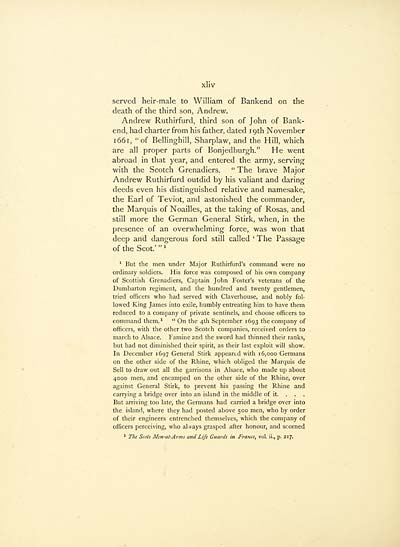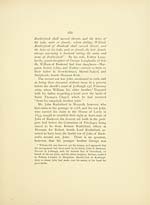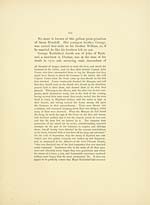Rutherfurds of that Ilk, and their cadets
(62) Page xliv
Download files
Complete book:
Individual page:
Thumbnail gallery: Grid view | List view

xliv
served heir-male to William of Bankend on the
death of the third son, Andrew.
Andrew Ruthirfurd, third son of John of Bank-
end, had charter from his father, dated 19th November
1661, "of Bellinghill, Sharplaw, and the Hill, which
are all proper parts of Bonj'edburgh." He went
abroad in that year, and entered the army, serving
with the Scotch Grenadiers. " The brave Major
Andrew Ruthirfurd outdid by his valiant and daring
deeds even his distinguished relative and namesake,
the Earl of Teviot, and astonished the commander,
the Marquis of Noailles, at the taking of Rosas, and
still more the German General Stirk, when, in the
presence of an overwhelming force, was won that
deep and dangerous ford still called ' The Passage
of the Scot.' " 1
1 But the men under Major Ruthirfurd's command were no
ordinary soldiers. His force was composed of his own company
of Scottish Grenadiers, Captain John Foster's veterans of the
Dumbarton regiment, and the hundred and twenty gentlemen,
tried officers who had served with Claverhouse, and nobly fol-
lowed King James into exile, humbly entreating him to have them
reduced to a company of private sentinels, and choose officers to
command them. 1 " On the 4th September 1693 the company of
officers, with the other two Scotch companies, received orders to
march to Alsace. Famine and the sword had thinned their ranks,
but had not diminished their spirit, as their last exploit will show.
In December 1697 General Stirk appeared with 16,000 Germans
on the other side of the Rhine, which obliged the Marquis de
Sell to draw out all the garrisons in Alsace, who made up about
4000 men, and encamped on the other side of the Rhine, over
against General Stirk, to prevent his passing the Rhine and
carrying a bridge over into an island in the middle of it. . . .
But arriving too late, the Germans had carried a bridge over into
the island, where they had posted above 500 men, who by order
of their engineers entrenched themselves, which the company of
officers perceiving, who abvays grasped after honour, and scorned
1 The Scots Men-at-Arms and Life Guards in France, vol. ii., p. 217.
served heir-male to William of Bankend on the
death of the third son, Andrew.
Andrew Ruthirfurd, third son of John of Bank-
end, had charter from his father, dated 19th November
1661, "of Bellinghill, Sharplaw, and the Hill, which
are all proper parts of Bonj'edburgh." He went
abroad in that year, and entered the army, serving
with the Scotch Grenadiers. " The brave Major
Andrew Ruthirfurd outdid by his valiant and daring
deeds even his distinguished relative and namesake,
the Earl of Teviot, and astonished the commander,
the Marquis of Noailles, at the taking of Rosas, and
still more the German General Stirk, when, in the
presence of an overwhelming force, was won that
deep and dangerous ford still called ' The Passage
of the Scot.' " 1
1 But the men under Major Ruthirfurd's command were no
ordinary soldiers. His force was composed of his own company
of Scottish Grenadiers, Captain John Foster's veterans of the
Dumbarton regiment, and the hundred and twenty gentlemen,
tried officers who had served with Claverhouse, and nobly fol-
lowed King James into exile, humbly entreating him to have them
reduced to a company of private sentinels, and choose officers to
command them. 1 " On the 4th September 1693 the company of
officers, with the other two Scotch companies, received orders to
march to Alsace. Famine and the sword had thinned their ranks,
but had not diminished their spirit, as their last exploit will show.
In December 1697 General Stirk appeared with 16,000 Germans
on the other side of the Rhine, which obliged the Marquis de
Sell to draw out all the garrisons in Alsace, who made up about
4000 men, and encamped on the other side of the Rhine, over
against General Stirk, to prevent his passing the Rhine and
carrying a bridge over into an island in the middle of it. . . .
But arriving too late, the Germans had carried a bridge over into
the island, where they had posted above 500 men, who by order
of their engineers entrenched themselves, which the company of
officers perceiving, who abvays grasped after honour, and scorned
1 The Scots Men-at-Arms and Life Guards in France, vol. ii., p. 217.
Set display mode to:
![]() Universal Viewer |
Universal Viewer | ![]() Mirador |
Large image | Transcription
Mirador |
Large image | Transcription
Images and transcriptions on this page, including medium image downloads, may be used under the Creative Commons Attribution 4.0 International Licence unless otherwise stated. ![]()
| Histories of Scottish families > Rutherfurds of that Ilk, and their cadets > (62) Page xliv |
|---|
| Permanent URL | https://digital.nls.uk/95748079 |
|---|
| Description | A selection of almost 400 printed items relating to the history of Scottish families, mostly dating from the 19th and early 20th centuries. Includes memoirs, genealogies and clan histories, with a few produced by emigrant families. The earliest family history goes back to AD 916. |
|---|

